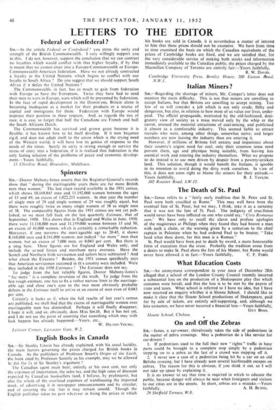Spinsters
SIR,—Doctor Nlahony-Jones asserts that the Registrar-General's records. show that "during the marriageable years there are far more British men than women." The last exact record available is the 1931 census, which shows 10,169,845 men and 11,192,060 women between the ages of 15 and 49; an excess of 1,022,215 women.. In that year the number of single men of 29 and single women of 29 was roughly equal, but there were roughly twice as many single women of 38 as single men of 38. The comparable figures from the 1951 census are not yet pub- lished, so we unlit fall back on the last quarterly Estimate, that of September, 1950. This shows that in England and Wales in June, 1950, there were 11,118,000 men and 11,159,000 women between 15 and 50, an excess of 41,000 women, which is certainly a remarkable reduction. Moreover, if one narrows the marr:ageable age to 20-45, it shows 8,168,000 men and 8,161,000 women; not indeed " far more" men than women, but an excess of 7,000 men, or 0.043 per cent. But there is a snag here. 1 hese figures are for England and Wales only, and include the armed forces and merchant navy overseas. Have the Scotch and Northern Irish servicemen and sailors been subtracted ? And what about the Eireanns ? Besides, the 1951 census specifically says that American servicemen stationed in th's country were included. Were they included in the 1950 Estimates? The Estimate does not say.
o judge from the last reliable figures, Doctor Mahony-Jones's "far more" is a complete inversion of the truth. To judge from the last rough estimate, one has to fix a rather narrow limit to the marriage- able age and close one's eyes to the two most obviously probable defects in the Estimate itself to arr:ve at an excess of men even of 0.043 per cent. Certainly it looks as if, when the full results of last year's census are published, we shall find that the excess of marriageable women over marriageable men has diminished. Perhaps it will finally disappear;
I hope it will, and so, obviously, does Miss Sm:th. But it has not yet, and I do not see the point of asserting that something which may with luck happen has already happened.—Yours, etc.,
Leinster Corner, Lancaster Gate, W.2. W. HILTON-YOUNG.


































 Previous page
Previous page